|
|
|
Sort Order |
|
|
|
Items / Page
|
|
|
|
|
|
|
| Srl | Item |
| 1 |
ID:
111559
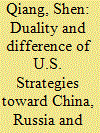

|
|
|
|
|
| Publication |
2011.
|
| Summary/Abstract |
Globalization has complicated the strategic interests of major powers: integration of their strategic interests leads to their cooperation and interdependence on the one hand, and conflicts of their strategic interests result in their frictions and competitions on the other. The U.S. will try to maximize its strategic interests by utilizing its constructive cooperation with China, Russia and India on the one hand and, on the other hand, seek global and regional hegemony to contain and prevent the three countries from growing strong to become challenges to its hegemonic status. The U.S. strategies toward China, Russia and India are dual and different in degrees and contents. The U.S. will continue to hedge its bets on both the positive and negative sides of its strategies in the future.
|
|
|
|
|
|
|
|
|
|
|
|
|
|
|
|
| 2 |
ID:
098752
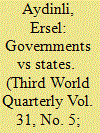

|
|
|
|
|
| Publication |
2010.
|
| Summary/Abstract |
This article begins by questioning the transferability of Western conceptualisations of the 'state' to the developing world, particularly to those areas in which security concerns are extreme. It proposes that the complicated relationship between security and political liberalisation produces a reform-security dilemma, which in turn may result in dual-governance structures consisting of an autonomous 'state' bureaucracy and a relatively newer, political 'government'. The dynamics of such a duality are explored through a longitudinal comparison of two critical cases: Iran and Turkey. Both cases reveal evidence of the 'state' and 'government' as distinct bodies, emerging over time in response to conflicting pressures for security and liberalisation. While the Iranian case remains entrenched in a static duality with an advantaged 'state', the Turkish case provides optimism that, under certain conditions, an eventual subordination of the state to the political government can take place.
|
|
|
|
|
|
|
|
|
|
|
|
|
|
|
|
| 3 |
ID:
168399
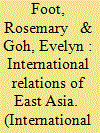

|
|
|
|
|
| Summary/Abstract |
East Asia is a region of signal importance for global order because of its economic dynamism and growing heft, China's challenge to the United States as incumbent regional and global hegemon, and other conflict hotspots like the Korean peninsula. This requires academic analysis that both appreciates the subtleties inherent to this region and can relate them to the wider systemic context. Many analysts have begun to allude to the challenging characteristics that are present in the international relations of East Asia, in particular struggling to explain how growing levels of economic interdependence can coexist with heightened security tensions. This article offers a research prospectus that suggests ways of analyzing these apparently contradictory trends. It proposes the development of research questions and approaches that are more suited to studying the international relations of a region with characteristics that we define as dual, hybrid, and contingent. We propose a Conjunctions Analytical Framework that explores what happens at the conjunctions of the regional-global and the unit-regional/global levels of analysis—the “grey areas” where social formations meet and interact. We aim to help shape the future study of the IR of East Asia and to suggest more effective ways of analyzing the complex reality of East Asia's regional and global politics.
|
|
|
|
|
|
|
|
|
|
|
|
|
|
|
|
| 4 |
ID:
181158
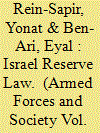

|
|
|
|
|
| Summary/Abstract |
Enacted in 2008, 60 years after Israel Defense Forces was established, the Israeli Reserves Law is a striking expression of the decline of military autonomy in a democratic country. While not aimed at reducing the military’s discretion in regard to the training, deployment, and compensation for reservists, the formal enactment of the Law in effect did so. The legislative process was preceded by a crisis between reservists and the military and was led by several reservists’ organizations who tried to improve the standing and resources allocated to the reserve forces. The article analyzes the impact of these organizations and the coalitions they created with politicians serving in the national parliament, the Knesset. By choosing the legislative option to improve the conditions of service for reservists, they de facto reduced military autonomy since the new Law mandated supervision and monitoring (by civilian institutions) of the service of reservists and extended into the core area of military action, the operational use of force. Thus, the actions of reservists’ organizations turned a bilateral tie between the military and its (reserve) soldiers into a trilateral one, comprising the military, reserve soldiers, and state institutions.
|
|
|
|
|
|
|
|
|
|
|
|
|
|
|
|
| 5 |
ID:
187477
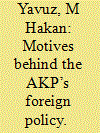

|
|
|
|
|
| Summary/Abstract |
This paper examines the role of ideas and identities in the making of the AKP’s foreign policy in Turkey. After briefly examining the institutional and international constraints on Turkish foreign policy before 2002, the discussion turns to the driving factors in three evolutionary stages of AKP’s foreign policy. It becomes apparent that a neo-Ottoman worldview and accompanying identity constitute the interpretive framework of the AKP’s political elite. The article traces how this worldview became dominant in Turkey’s policy making after the government dismantled the country’s Kemalist institutions and the AKP consolidated its political power.
|
|
|
|
|
|
|
|
|
|
|
|
|
|
|
|
| 6 |
ID:
190312
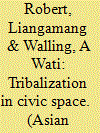

|
|
|
|
|
| Summary/Abstract |
The Naga, comprised of various tribes, were traditionally governed by independent village republics. The inclusion of the Naga areas into the modern Indian State has been opposed, ensuing in a long-drawn armed struggle for sovereignty. Military measures have been used to deal with this struggle. Naga society is characterized by dualities in the form of the categorization of tribes as an administrative category against the discourse of a greater Naga identity, experiences of electoral politics to the Naga indigenous form of democracy rooted in the village republic, and the protracted Naga political struggle to the idea of Nagaland state as a solution, among many others. These dualities have shaped collective actions in the forms of associations and organizations to constitute the Naga civil society. The paper examines the socio-political realities and the resulting collective actions as a dimension of civil society.
|
|
|
|
|
|
|
|
|
|
|
|
|
|
|
|
|
|
|
|
|